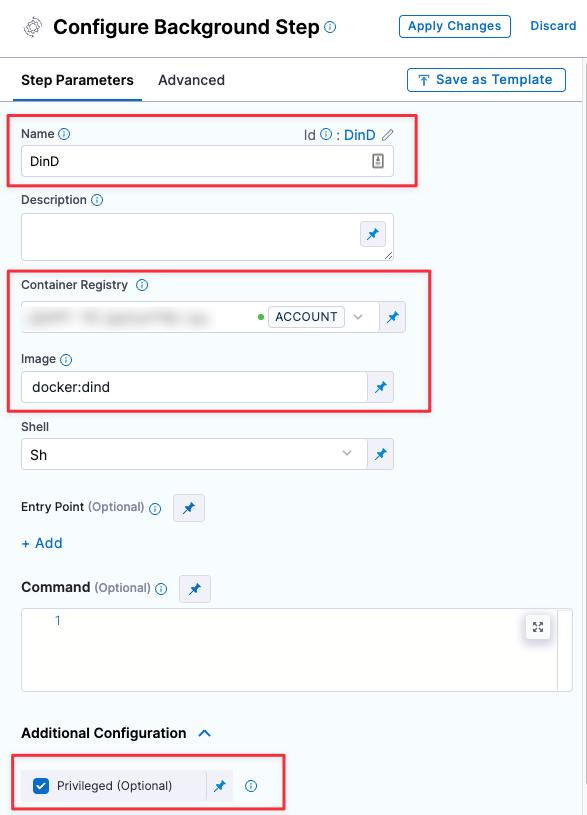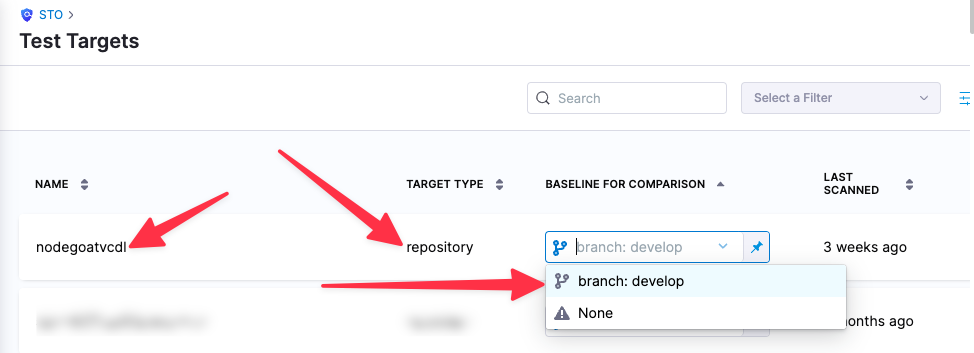Fossa scanner reference
Currently, this integration is behind the Feature Flag STO_STEP_PALETTE_FOSSA. Contact Harness Support to enable the feature.
You can scan container images and repositories using Fossa, a scanner that detects security vulnerabilities and other issues in open-source projects.
Before you begin
Docker-in-Docker requirements
Docker-in-Docker is not required for ingestion workflows where the scan data has already been generated.
You need to include a Docker-in-Docker background service in your stage if either of these conditions apply:
- You configured your scanner using a generic Security step rather than a scanner-specific template such as Aqua Trivy, Bandit, Mend, Snyk, etc.
- You’re scanning a container image using an Orchestration or Extraction workflow.
Set up a Docker-in-Docker background step
Go to the stage where you want to run the scan.
In Overview, add the shared path
/var/run.In Execution, do the following:
- Click Add Step and then choose Background.
- Configure the Background step as follows:
- Dependency Name =
dind - Container Registry = The Docker connector to download the DinD image. If you don't have one defined, go to Docker connector settings reference.
- Image =
docker:dind - Under Optional Configuration, select the Privileged checkbox.
- Dependency Name =

Root access requirements
You need to run the scan step with root access if either of the following apply:
You need to run a Docker-in-Docker background service.
You need to add trusted certificates to your scan images at runtime.
You can set up your STO scan images and pipelines to run scans as non-root and establish trust for your own proxies using self-signed certificates. For more information, go to Configure STO to Download Images from a Private Registry.
Fossa step configuration
The recommended workflow is add a Fossa step to a Security Tests or CI Build stage and then configure it as described below.
- UI configuration support is currently limited to a subset of scanners. Extending UI support to additional scanners is on the Harness engineering roadmap.
- Each scanner template shows only the options that apply to a specific scan. If you're setting up a repository scan, for example, the UI won't show Container Image settings.
- Docker-in-Docker is not required for these steps unless you're scanning a container image. If you're scanning a repository using Bandit, for example, you don't need to set up a Background step running DinD.
- Support is currently limited to Kubernetes and Harness Cloud AMD64 build infrastructures only.
Scan
Scan Mode
The orchestration mode to use for the scan. The following list includes the UI and YAML values for the supported options.
- Ingestion Ingestion scans are not orchestrated. The Security step ingest results from a previous scan (for a scan run in an previous step) and then normallizes and compresses the results.
Scan Configuration
The predefined configuration to use for the scan. All scan steps have at least one configuration.
Target
Type
The target type to scan for vulnerabilities.
- Repository Scan a codebase repo.
- Container Image Scan the layers, libraries, and packages in a container image.
Name
The Identifier that you want to assign to the target you’re scanning in the pipeline. Use a unique, descriptive name such as codebaseAlpha or jsmith/myalphaservice. Using descriptive target names will make it much easier to navigate your scan data in the STO UI.
Variant
An identifier for a specific variant to scan, such as the branch name or image tag. This identifier is used to differentiate or group results for a target. Harness maintains a historical trend for each variant.
You can see the target name, type, and variant in the Test Targets UI:

Workspace (repository)
The workspace path on the pod running the Security step. The workspace path is /harness by default.
You can override this if you want to scan only a subset of the workspace. For example, suppose the pipeline publishes artifacts to a subfolder /tmp/artifacts and you want to scan these artifacts only. In this case, you can specify the workspace path as /harness/tmp/artifacts.
Ingestion File
The Fossa JSON results file to ingest.
Log Level, CLI flags, and Fail on Severity
Log Level
The minimum severity of the messages you want to include in your scan logs. You can specify one of the following:
- DEBUG
- INFO
- WARNING
- ERROR
Fail on Severity
Every Security step has a Fail on Severity setting. If the scan finds any vulnerability with the specified severity level or higher, the pipeline fails automatically. You can specify one of the following:
CRITICALHIGHMEDIUMLOWINFONONE— Do not fail on severity
The YAML definition looks like this: fail_on_severity : critical # | high | medium | low | info | none
Additional Configuration
In the Additional Configuration settings, you can use the following options:
Advanced settings
In the Advanced settings, you can use the following options:
YAML pipeline example
This pipeline pulls a Fossa JSON data file from a GitHub repo and then ingests it.

pipeline:
name: smp-fossa
identifier: fossastp
projectIdentifier: STO
orgIdentifier: default
tags: {}
stages:
- stage:
name: fossa-test
identifier: fossatest
type: SecurityTests
spec:
cloneCodebase: false
execution:
steps:
- step:
type: Run
name: Pull File
identifier: Pull_File
spec:
connectorRef: MY_DOCKER_CONNECTOR
image: alpine/curl
shell: Sh
command: |-
curl https://github.com/myorg/fossa-scans/latest.json > /harness/latest.json
cat /harness/latest.json
- step:
type: Fossa
name: Fossa_1
identifier: Fossa_1
spec:
imagePullPolicy: Always
mode: ingestion
config: default
target:
type: repository
name: test
variant: test
ingestion:
file: /harness/latest.json
infrastructure:
type: KubernetesDirect
spec:
connectorRef: MY_DELEGATE
namespace: harness-delegate-ng
automountServiceAccountToken: true
nodeSelector: {}
os: Linux